A Dawn of Mammals Collection Read online
Page 28
“Tongs. Wooden tongs. That should be simple enough to make, using a couple lengths of wood, fairly flat, not too thin. Maybe grind some away at the end so there’s a concavity.”
“I could do that. Even while we sit here and talk.”
“Okay, sure, that’d be great,” Hannah said.
Ted hopped up, saying, “I’ll look around just outside the trees.”
“Don’t go far,” Hannah said.
Dixie was up on her elbows, straining to see what Hannah had done. “Won’t the water just come out the holes between those leaves?”
“Yeah, I think it will. So I’m thinking maybe not leaves for the basket, but find a tree where the bark strips easily.”
“Like a birch tree? That you see the bark kind of peeling off?”
“Exactly,” Hannah said, gathering up some of the palm leaves. She sat down by Dixie’s side. “Like four long strips. But imagine this is much wider. I’m going to try a scaled-down model, basically.” She crossed two leaves. Then she added another leaf, at a 45-degree diagonal, and a fourth, perpendicular to that, so she had an eight-pointed star. She used her fingernail to crease the leaves about three inches from the center in all eight directions. Then she gathered the ends together and brought them up. “Somehow, this part would get twisted together to make a handle.”
“And that would be waterproof?”
“No. Maybe not entirely.” Hannah let the rough model drop to the ground, and the leaves settled back flat. “Maybe I could find pitch—tree sap. Maybe I could line it with gingko leaves, which are bigger....” She was thinking.
“Or you said you had to find clay for the water pool. Maybe make pots instead of baskets?”
“Right. That makes sense. It would take some trial and error, but that’s possible too. Bake them in the steam pit, basically, to harden the pots.”
“Do you need anything but clay and water to make them? Is there some special thing that gets used to make pots? I don’t know.”
Hannah said, “I don’t know, either. Unless someone here is a potter and hasn’t mentioned it yet, all we can do is try, fail, try a little better, and circle around the solution until we find it.”
“Like with the fishing net.”
“Or the cordage, way back at the beginning.”
Dixie said, “Rex figured that out. It still pisses me off that he got it when I didn’t.”
“Yeah, he seems to have that ability.”
“What’s my ability?”
“You have great vision, for one thing.”
Dixie scoffed. “Like that’s a talent. It’s like my hair color or something. I didn’t do anything to get it.”
“Rex may not have done anything to get the engineering gene, either. I suspect there’s some way a brain is put together that allows people to find elegant solutions about simple machines. Or cords, or nets. Experience would help, of course, but I wouldn’t be surprised if there’s more activity in a certain part of his brain. Something like that.”
Dixie shrugged. “So anyway. Pots? Or a basket?”
Hannah put her mind back on task. “Maybe a combination?”
“What do you mean?”
“Well, we could weave baskets like this, of the palms. And then we pat clay around them, and bake them. So you’d have the vegetable material adding structure. Maybe? What do you think?”
“Maybe.” Dixie swatted at a buzzing insect. “I guess you’re right. All we can do is try, and if it doesn’t work, try something else.”
“Yeah. Fumble our way to competence.” She glanced down at the girl’s leg. “How’s your knee?”
“Better, I think.” She frowned. “It would be so easy if we had a Walmart here. We’d just run over there and, for ten bucks, you’d have a soup pot.”
“And I’d get you some ibuprofen. But I think the nearest Walmart is out of our reach.”
“I know. But I took that stuff for granted. I mean, when I’m out of lipstick, I’m out of lipstick. Forever.”
“Oh, that should be easy to fix. Ripe berries, something like that, could stain your lips red for a short time.”
“Right. I can just imagine me smooshing berries on my face every half-hour. Great idea.”
Chapter 21
The moment of pleasant conversation seemed to have ended. Dixie’s natural sarcasm was reasserting itself. “Anyway,” said Hannah, standing up. “I need to check on Ted. Scream if anything bad happens here.” She dusted herself off and left the circle of trees in the same direction Ted had gone.
He was at the fire, seated there, a pile of sticks by his knee. He glanced up. “Oh good. I was going to come ask for your knife.”
She realized she did still have it. She should have handed it over to Claire for cleaning fish. She pulled it out of her pocket and handed it over. “What do you need it for?”
“Need to get a start to split these.” He pulled out the knife blade and jammed it in the broken end of a branch, wiggled it back and forth, and then centered it in the opening. He made a fist and punched down on the hilt of the knife, and the wood split further. Plucking the knife out, he put it aside, on a rock. Then he slowly pulled the two sides of the branch apart until it had split into half.
“Excellent,” she said. “Neatly done. Now what?”
He matched up the ends again and, holding one side in each hand, opened and closed the far ends, like tongs. “I guess maybe nothing more complicated than this,” he said, reaching with the tongs for one of the smaller rocks. He closed the jaws around it, and started to pick it up, but it slid right back to the ground. “Okay, maybe not so simple.”
“Come back into the tree ring, would you? You bring the wood. I’ll grab up my knife. You can keep working on it in there.” They had built a partial stockade wall around the ring of trees, leaving an opening to the fire ring. And then they had been weaving living vines up through the stockade uprights too, in spare moments. In a couple weeks, as the vines sprouted more leaves, it’d look like an actual wall was surrounding them.
“Okay,” he said distractedly, opening and closing the tongs again. “Maybe if I carved a notch back here....” He opened the tongs all the way.
“Ted. Let’s get back behind the trees.”
“Right,” he said, getting to his feet without any apparent effort. Hannah usually pushed off the ground with one hand to get up. Bob had to roll on his knees and then get up using both hands. Ted, with his youth, flexibility, and natural athleticism, was able to go from lotus position to his feet in a single, smooth motion.
The rat. She smiled at her petty jealousy as she followed him back into the protection of the tree ring.
For the next few hours, she and Ted worked at turning their concepts into the real thing—in her case, at least into a model of a cooking basket. Ted made good progress on the tongs, though. And as he used them more, he was getting more dexterous at it. By the time they quit, he was able to toss a rock up with the tongs and catch it mid-air.
“I might be able to juggle three rocks, with a little bit of practice,” he said.
Hannah laughed. “I can’t imagine a survival application, but you might entertain the troops with that.”
Dixie was looking pouty. Hannah realized she probably didn’t like being anything other than the center of attention—at least one person’s rapt attention. Without Nari, her hanger-on, she needed something else to soothe what must be a restless soul indeed. She asked the girl, “How’s your knee coming along?”
“Quit asking me that,” she snapped.
Ted looked up, surprise obvious on his face. “Geez, Dix, what’s wrong?”
“I’m sick of sitting here.”
Hannah said, “Okay, so get up. We’ll see how your knee is holding you up. No, sit back down, Ted. I’ll help her.” She went to give the girl an arm up.
Dixie stood, carefully shifted her weight, and then shook off Hannah’s arm. “I can stand,” she said.
Hannah refused to rise to the bait of her
petulance. “How about walking?”
Gingerly, Dixie took one step, and then another. At first she limped, but as she gained more confidence the knee was going to hold her, her gait grew steadier. There was still a limp, but not a pronounced one. “I guess I’ll live,” she said.
“That’s good,” Hannah said. “I can see the bruising starting even from over here.”
“Yeah. I’ll look like a battered woman.”
Ted said, “You kind of are. Just not by a person. By a gigantic bird.”
“It really was that big?”
Ted said, “You saw it.”
“Not when it was close. I had my eyes closed.”
“Yeah, it was big, wasn’t it, Hannah?”
“If I curled up into a ball,” she said, “that would be about the size of its head.” She rotated her arms so that she could form a beak with them. “Except the beak is the width of the head and pretty wicked-looking.” She closed her eyes and pictured the bird again. “And it has this weird hinge thing going on with the jaw. Like it’s dropped, or recessed. Hard to remember, but there was something strange-looking about it.”
“I never looked at a bird’s beak before,” said Ted. “Not closely, anyway. Maybe they all look like that.”
Hannah had them work on stripping vines for netting for Rex. She tended the fire and patrolled just outside the circle of trees, wondering where to start digging to find clay.
She also debated with herself if it was worth the risk of building the pool in what was so obviously the terror crane’s hunting area.
She wanted that clear water. But she didn’t want to die for it.
Chapter 22
Mid-afternoon, the main group came back with a big haul of fish.
Jodi said, “We even threw those gross eels back.”
Garreth said, “Yeah, they didn’t taste the best.” Then he caught sight of Dixie, and her wrapped and elevated knee. “What happened? Are you okay, Dixie?” He sounded really worried.
Ted told the story of the terror crane and how he and Hannah chased it off.
Dixie said, “But not before it stood its fat ass on me and hurt me.”
Garreth took her a bottle of water. “Here. You must be thirsty.”
She took it and drank, not bothering to thank the boy. Nari sat next to her and started asking concerned questions. Garreth hovered around them.
Hannah said, “Someone pass Ted a bottle. He needs it even more, I’m sure. And drink up, Ted. You and me and someone else can go back to the lake and get more right away.” She’d about had her fill of Dixie for one day. She shouldn’t let the silly girl get under her skin, but she couldn’t seem to help herself.
As she, Ted, Zach, and Jodi took another trip back to the lake with the empty water bottles, she thought more about it. Maybe the problem was that Dixie was too much like those snotty girls in junior high she had known herself almost twenty years ago. The ones with the exclusive cliques, sneering at people. Sneering at Hannah, especially when she had her sister in tow. When you were thirteen or fourteen years old, that stuff really hurt. Being excluded hurt. The whispers and giggles hurt.
As an adult, you understood that either those girls had been jerks, and not worth thinking about, or they had been terribly insecure and miserable themselves, and that was just how it had emerged from them—not as painful shyness, not as nail-biting or obsessive hair-pulling, but as meanness and a grab for the petty power available to junior-high girls.
So if you know that now, Hannah, why do you still let her get under your skin?
Maybe, the truth was, the hurts we take on at age thirteen or fourteen don’t ever leave us entirely. Maybe it was part of why she didn’t like teenagers all that much. They reminded her of more painful times.
She looked around at the ones walking with her. Ted, Zach, and Jodi: they were solid people. At sixteen or sixty, they’d still be people she was willing to be around. Maybe at forty or at sixty, Dixie would be tolerable too. But for now, she was a pain, and a trial, and it was all Hannah could do not to tell her to eff off some days, reverting to teenage arguing tactics herself.
Jodi and Zach were talking about the fishing net, and how it had worked better, and why.
“And Claire caught two fish too,” Jodi said to Hannah.
“Good!” Hannah was happy to hear it. Happy for Claire’s success, and happy to add another survival skill to their growing list.
Ted said, “No sign of the crocogator?”
Jodi said, “No, but there was a little lizardy thing. Garreth saw it best. He said it wasn’t a baby of the big thing you guys fought. Something else.”
Zach said, “Mr. O’Brien said it was young, though. An immature specimen.”
Hannah didn’t like that. Two different species of water-dwelling predators was not a comforting thought. “We need to not let our guard down. Just because we’ve had a couple days without a problem at the lake doesn’t mean we never will again.”
“Maybe we make too much noise,” Jodi said. “Talking, the net splashing, like that. It might scare them off.”
“Maybe,” said Hannah. “Or maybe it takes a few days to digest a horse, even a small one. It might be hungry again tomorrow. So stay on your guard. Stay away from the edge of the water. And someone should always be on watch.”
That sobered their moods. Hannah went to the bank alone, and the kids sat well back from the water as it filtered through the bandana.
* * *
The next day, Hannah announced that she wanted everyone not involved in fishing to start the hunt for clay.
“How do we do that?” Zach asked.
“I don’t have a clue,” she said. “We need to dig and check the dirt. See if it’s sandy or clay.”
Nari said, “How do you know one from the other?”
Bob said, “When wet, you can make clay into a ball. Sandy soil would fall apart. And I have an idea on how to look.”
“What’s that?”
“I think one thing is that after a rain, I mean a rain heavier than this right now, you’d see some standing water. Sandy soils, it’d drain right through. But clay soils would resist.” He held his hands up. It was raining again this morning, but a light mist.
Nari said, “But how do you check that when there are plants over every single inch of the world?”
He smiled and waited for them to think about it.
Zach said, “Would there be more plants? Because the water stood there for longer?”
“Maybe,” said Bob. “And maybe, because clay soils are harder to grow in, the vines might be thinner, reflecting the thinner roots beneath that have had to force their way through the clay.”
“Which is it?” said Dixie. “More plants or less?”
Bob said, “I’m not sure. Just trying to get everyone to think, is all.”
Dixie rolled her eyes. Back to her regular self. She was limping part of the time, the sporadic nature of it coming from, Hannah suspected, theatricality more than a real physical cause.
They stayed within sightline of each other, kicking through ferns and vines, everyone with a sturdy stick to use for digging up soil samples. She had told people to take a pinch of soil and gather dew from nearby leaves to test its cohesion. As the morning wore on, the light rain stopped, and they had to switch to using their own saliva. By mid-morning, they had identified a patch of likely ground.
“We need something to dig with,” Jodi said. “A shovel. Buckets to carry the dirt.”
“Agreed,” Hannah said. “But we don’t have them, and there’s no way of making them. We’ll dig with sticks.”
“Then how will you carry the dirt?”
“I’ll empty one section of my backpack and put it in there.”
Jodi said, “There has to be some way to make a shovel. Find the right rock, and strap it somehow to a stick.” Her eyes went unfocused. “I guess not. I mean, I don’t know how to do that.”
Hannah said, “Me neither. Makes you realize how smart all
those primitive humans were, doesn’t it? That they figured out how to make spearheads or axe heads and attach them to the handles.”
Zach came up just then with a piece of plant in his hand. “Hannah, what about this?”
“You want to test it as food, you mean?” She stuck her hand out and took the plant. It was a short plant with flower buds, dark leaves, and a woody stem. Didn’t look like a potential food plant to her.
“Not for food,” Zach said. “Rub the leaves.”
She did. They had a slick feel.
“When it was wet, I thought maybe it would work as soap. It had that kind of feel to it, to me. Like a bar of wet soap.” He shook his head. “I’m not explaining it right.”
“No, I get it,” Hannah said. “Could be you’re right. And we still have to test it, but not by eating it. You test it on your skin, and maybe experiment with ways to process it into soap.”
“How is soap made?” he said.
She shrugged. She knew people made their own, but she had no idea how. It involved lye, right? And fat, like lard? Not something they were going to find a bag of here. “I think you’re going to have to figure that out on your own. But ask at camp tonight, over supper. Maybe someone knows something I don’t.”
Jodi said, “Maybe I can’t make a shovel. But you know, I could make a club.”
“A club?” Zach asked her.
“A weapon. You know, like a baseball bat. Hannah got me thinking about it when she said ‘primitive humans.’ I thought of cartoon cavemen. They’re always carrying a club. But why not? I mean, it’s a cartoon, but it’d make an okay weapon in real life, I think. And it’s easy to make. All you need to do is find the right fallen log, heavy, not old or brittle. A knot in it might even make a handle.”
Hannah had moved things around in her backpack to empty one compartment, and by the time they had finished their hunt, she filled that with the fine-particle soil that seemed most likely to work to make clay. She was going to experiment with drying test pots in the fire, near the fire, in the steam pit, and seeing what happened. By tomorrow morning, she’d know if she had something that would work as cooking vessel and mortar for the pond, or if they had to start the hunt for clay all over again.

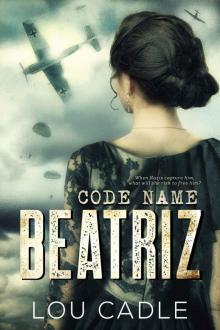 Code Name- Beatriz
Code Name- Beatriz Oil Apocalypse Collection
Oil Apocalypse Collection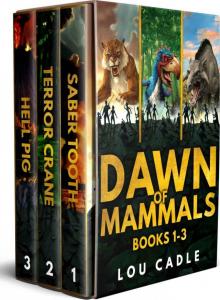 A Dawn of Mammals Collection
A Dawn of Mammals Collection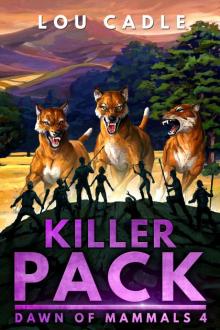 Killer Pack (Dawn of Mammals Book 4)
Killer Pack (Dawn of Mammals Book 4)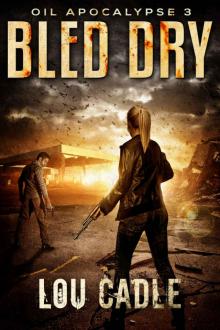 Bled Dry
Bled Dry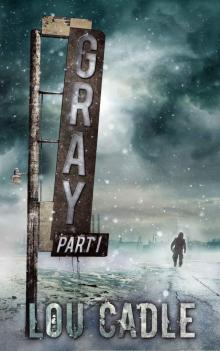 Gray (Book 1)
Gray (Book 1) Dawn of Mammals (Book 4): Killer Pack
Dawn of Mammals (Book 4): Killer Pack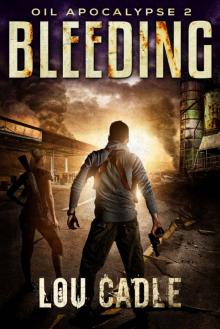 Bleeding (Oil Apocalypse Book 2)
Bleeding (Oil Apocalypse Book 2)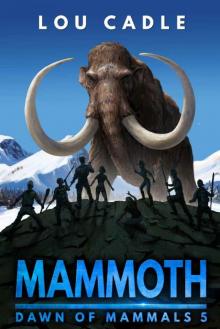 Dawn of Mammals (Book 5): Mammoth
Dawn of Mammals (Book 5): Mammoth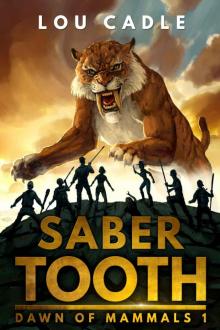 Saber Tooth (Dawn of Mammals Book 1)
Saber Tooth (Dawn of Mammals Book 1)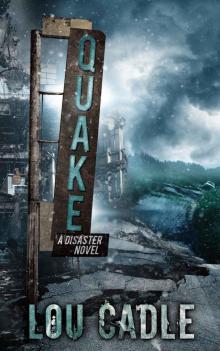 Natural Disaster (Book 2): Quake
Natural Disaster (Book 2): Quake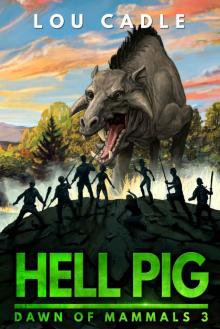 Hell Pig (Dawn of Mammals Book 3)
Hell Pig (Dawn of Mammals Book 3)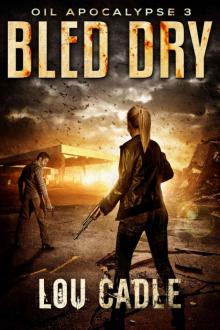 Bled Dry (Oil Apocalypse Book 3)
Bled Dry (Oil Apocalypse Book 3)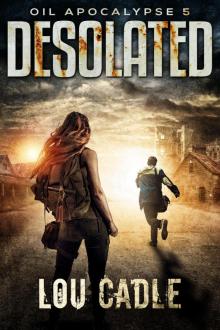 Desolated
Desolated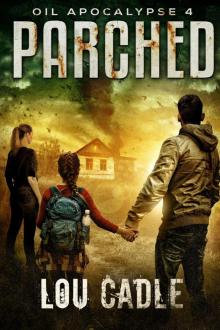 Parched
Parched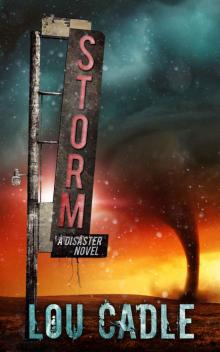 Natural Disaster (Book 3): Storm
Natural Disaster (Book 3): Storm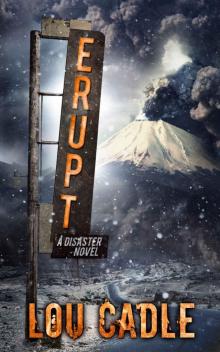 Natural Disaster (Book 1): Erupt
Natural Disaster (Book 1): Erupt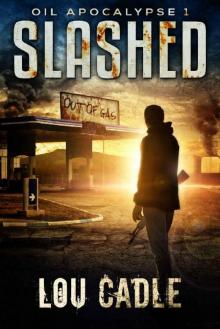 Slashed (Oil Apocalypse Book 1)
Slashed (Oil Apocalypse Book 1)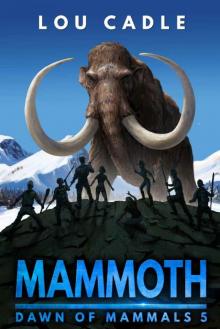 Mammoth (Dawn of Mammals Book 5)
Mammoth (Dawn of Mammals Book 5)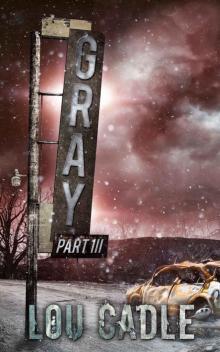 Gray (Book 3)
Gray (Book 3)